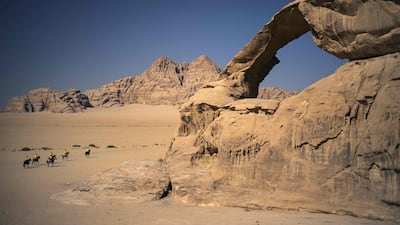The UAE, Jordan and Israel signed an agreement to develop a renewable energy and desalination facility in the Hashemite kingdom to mitigate climate change and add to the growth of clean energy in the country.
The partners will build solar photovoltaic plants with the capacity to generate 600 megawatts of electricity in Jordan. The electricity will be exported to neighbouring Israel, a country that shares a peace treaty with Amman.
They will also develop a desalination programme in Israel that will supply Jordan with 200 million cubic metres of water.
US presidential envoy for climate John Kerry attended the signing ceremony in Dubai.
Feasibility studies for the project will begin in 2022.
"Climate change is already having a major impact on countries and communities in the Middle East. As we prepare to host Cop28 in the UAE in 2023, we demonstrate with this declaration that all nations can work together to further the energy transition and build a more sustainable future for all," said Sheikh Abdullah bin Zayed, Minister of Foreign Affairs and International Co-operation.
The UAE became the first country in the Arab world to pledge to reach net-zero emissions by 2050. Israel has also pledged to become carbon neutral by the same year.
Israel and Jordan already have a relationship in terms of energy. Tel Aviv exports gas from its Leviathan fields to Amman.
"All residents of the Middle East will benefit from this memorandum of understanding, not just Jordan and Israel. This is a message to the world on how countries can act together to fight the climate crisis," Israeli Energy Minister Karine Elharrar said.
Jordan, which imports more than 94 per cent of its energy needs, is looking to diversify its grid by incorporating renewable energy sources such as solar and wind into its mix. The country plans to increase the share of renewables in its energy mix to 30 per cent by 2030, as it comes closer to expanding the share of solar and wind to 20 per cent of overall electricity production this year.
The UAE has been an investor in Jordan's power grid, helping the country decarbonise by building renewable power plants.
Masdar, the UAE's renewable developer, is an early developer of renewables in Jordan. The company made its first overseas investment in a Jordanian wind farm in 2013.
"The UAE is pleased to play a role in bringing Israel and Jordan together in an initiative that reinforces both countries’ climate security and common interests. This declaration is just one of the positive outcomes of the Abraham Accords that is serving to reinforce regional peace, stability and prosperity while improving the lives and the future prospects of all the people of the region," Sheikh Abdullah said.
Jordan and Israel, which are both water-scarce countries, have previously been working out a plan to direct water from the Red Sea to replenish the fast-depleting Dead Sea. Arid states such as Israel have also used the drip adoption technique to manage their water deficits to grow vegetation. Drip irrigation systems are able to control precisely the amount of water delivered to the crop, potentially maintaining a high level of irrigation efficiency.
Jordan is expected to exhaust its underground freshwater sources in the next 40 years, according to Mercy Corps, a global humanitarian organisation.
"Climate change and the influx of refugees have further exacerbated Jordan’s water challenges, however, there are many opportunities for regional co-operation to help increase sustainability in the sector," said Mohammad Al Najjar, Jordan’s Minister of Water and Irrigation.
A 2014 World Bank feasibility study on the project said that if no action was taken, the area near the Dead Sea would suffer from further sinkholes, mudflats and landslides that will affect terrestrial and aquatic ecosystems, tourism and the chemical industry. The lake’s water level is declining by more than one metre a year.


